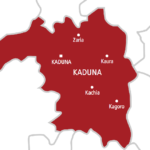In Abuja, you can find hawkers of this yellowish delicacy along major streets and other strategic places in a city that is interestingly reputed to be a home to several fancy restaurants and lounges that specialise in local and continental dishes, which are out of the reach of the average Abuja resident.
So for many low income earners, okpa is a life-saving snack, which goes for as little as N50, depending on the size and quality. Some are stuffed with boiled eggs and ugwu leaves, while others are made plain. The hawkers, young and middle-aged women, with little bowls delicately placed on their heads, meander through the streets of the city in search of customers. They are a common sight, especially around Wuse market, Berger junction and other major bus stops like Area 3 junction.
It is prepared from Bambara nuts but it has different names. It is a little hard peanut grown in Nigeria. Though in other countries the nut may be eaten in different forms as snacks or drunk as beverages but in Nigeria, it is eaten as a meal.
It is prepared after the nuts have been crushed and mixed with different ingredients. It is then packaged in nylons or preferably banana leaves, which make it maintain its natural taste and colour. Thereafter it is cooked at a very high temperature then it is ready for consumption with an appearance like that of moi moi though it is stronger in texture.
An okpa seller, Faith Obasemi, told our reporter that she has been in the business for five years and she started with just N2000. Interestingly, she takes care of her family from the business and it has been good so far even though it doesn’t pay much. However, she says she is content the way she is.
A typical workday for Obasemi begins at 2am when all arrangements are made to begin preparing the stuff and by 5 am, she sets out for business at her usual spot around Berger junction. She said she doesn’t have fixed business hours as she closes whenever the snack is finished. “My closing time depends on the task force people who come to disrupt my business virtually every day. Sometimes, when they come I have no option but to pack my things and run. The main challenge of this business is the task force, they just wouldn’t let us be,” the okpa seller explained.
The major difference between Enugu okpa and the one that sold here is that the one in the east is wrapped in banana leaves while the type in Abuja is mostly sold in nylon. However, some okpa lovers argue that the taste of Enugu okpa isn’t the same with the one made here, as the former is richer and tastes better.
Obasemi’s okpa looks inviting when you get close to it. The palm oil gives it the yellowish orange colour and when cut into two halves, you notice that the okpa has boiled egg and ugwu leaves in it, which simply enriches the delicacy and makes it more nutritious.
Apparently, the ability of okpa to fill up one’s stomach for long has made it a common food everywhere and arguably not for any other quality it possesses. It could either be taken as breakfast or lunch and it is undoubtedly a food for all ages.
For Abuja residents and visitors who would love to taste Nigeria’s locally made delicacy and those who are yet to try Abuja okpa, you have got to stop the next okpa seller you see to have a taste of it.
 Join Daily Trust WhatsApp Community For Quick Access To News and Happenings Around You.
Join Daily Trust WhatsApp Community For Quick Access To News and Happenings Around You.

